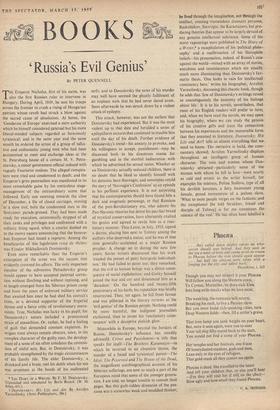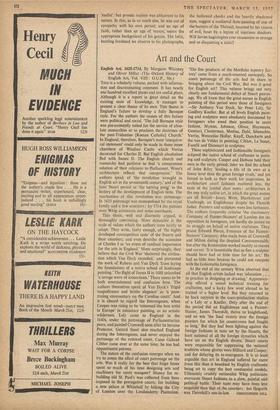BOOKS
'Russia's Evil Genius'
BY PETER QUENNELL TliE Emperor Nicholas, first of his name, was also the first Russian ruler to intervene in Hungary. During April, 1849, he sent his troops across the frontier to crush a rising of Hungarian patriots whose revolt had struck a blow against the sacred cause of absolutism. At home, the 'Gendarme of Europe' exercised a stern authority which he himself considered paternal but his more liberal-minded subjects regarded as ferociously tyrannical; and in the same year and the same month he ordered the arrest of a group of talka- tive and enthusiastic young men who had been accustomed to meet and exchange ideas at the St. Petersburg house of a certain M. V. Petra- shevsky, a minor government official imbued with vaguely Fourierist notions. The alleged conspira- tors were tried and condemned to death; and the Emperor's grim paternalism was manifested in its most remarkable guise by his meticulous stage- management of the extraordinary scene that followed. Early one morning towards the close of December, a file of closed carriages, moving at a slow trot, bore the condemned men to the Seniyonov parade-ground. They had been made ready for execution, ceremonially stripped of all their ranks and privileges and confronted with a military firing squad, when a courier dashed on to the snowy square announcing that the benevo- lent Emperor had issued a reprieve. Among the beneficiaries of this lugubrious coup de theatre was Fyodor Mikhailovich Dostoievsky.
Even more remarkable than the Emperor's conception of the scene was the success that evidently crowned his efforts. The only important member of the subversive Petrashevsky group would appear to have accepted paternal correc- tion without flinching and without repining, and at length emerged from his Siberian prison camp and from the years of enforced military service that awaited him once he had shed his convict's irons, as a devoted supporter of the Imperial throne and a fierce critic of revolutionary move- ments. True, Nicholas was lucky in his pupil; for Dostoievsky's nature included a pronounced strain of masochism. Or, rather, he had a feeling of guilt that demanded constant expiation. Its origins must always remain obscure, since, in the complex character of the guilty man, the develop- ment of a sense of sin often antedates the commis- sion of sinful acts. But, in Dostoievsky, it • was probably strengthened by the tragic circums.tances of his family life. The elder ' Dostoievsky, a drunkard and a brute, met his death when his son was seventeen at the hands of his maltreated * THE DIARY OF A WRITER. By F. M. Dostoievsky. Translated and annotated by Boris Brasol. (W. H. Allen, 45s.) t DOSTOUNSKY ■ His Life and .Art. By Avrahm Yarmolinsky. (Arco Publications, 30s.) serfs; and to Dostoievsky the news of his murder may well have seemed. the ghastly fulfilment of an impious wish that he had never dared avow. Soon afterwards he was struck down by a violent attack of epilepsy.
This attack, however, was not the earliest that Dostoievsky had experienced. But it was the most violent up to that date and heralded a series of epileptiform seizures that continued to trouble him until the day of his death. Further evidence of Dostoievsky's trend—his anxiety to provoke, and his willingness to accept, punishment—may be discerned both in his disastrous mania for gambling and in the morbid indiscretion with which he advertised his sexual tastes. Whether or no Dostoievsky actually seduced children, there is no doubt that he liked to identify himself with his demonic hero Stavrogin, and sometimes retold the story of `Stavrogin's Confession' as an episode in his personal experience. It is not surprising that his contemporaries should have found him a dark and enigmatic personage, or that Russians of the post-Revolutionary era, who admire his Pan-Slavonic theories but detest his peculiar brand of mystical conservatism, have alternately exalted his genius and agreed to revile him as a reac- tionary monster. Thus Lenin, in July, 1918, signed a decree, placing him next to Tolstoy among the authors who deserved a statue; and he was at that time generally, acclaimed as a major Russian prophet. A change set in during the next few years; Soviet writers discovered that his work 'exuded the poison of petty bourgeois individual- ism.' He had failed to Point out, they remarked, that the evil in human beings was a direct conse- quence of social exploitation; and Gorky himself joined the hue and cry and denounced him as a 'decadent.' On the hundred and twenty-fifth anniversary of his birth, his reputation was briefly resurrected. Then, yet again, he fell from favour and was pilloried in the literary reviews as the 'evil genius' of the Russian people. Nothing could be more harmful, the indignant journalists exclaimed, than to invest his 'reactionary coun- tenance' with a deceptive pinkish glow. . . .
Meanwhile in Europe, beyond the borders of Russia, Dostoievsky's influence has steadily advanced. Crime and Punishment—a title that speaks for itself—The Brothers Karamazov—in which he reverted to an obsessive theme, the murder of a hated and tyrannical parent—The Idiot, The Possessed and The House of the Dead, the magnificent autobiographical account of his Siberian sufferings, are now so much a part of the European mind that some of the younger genera- tion, I am told, no longer trouble to consult, their pages. But this guilt-ridden dramatist of the pas- sions was a somewhat weak and muddled thinker; he lived through the imagination, not through the intellect, creating tremendous dramatis persona, Raskolnikov, Stavrogin, the Karamazovs, but pro- ducing theories that appear to be largely devoid of any genuine intellectual substance. Some of his worst vapourings were published in The Diary of a Writer,* a recapitulation of his 'political philo- sophy' and a reaffirmation of his Slavophile beliefs—his presentation, indeed, of Russia's case against the world—mixed with an array of stories, anecdotes and reminiscences which are usually much more illuminating than Dostoievsky's fav- ourite thesis. 'One looks in vain for intellectual consistency here,' writes his biographer, Avrahm Yarmolinsky, discussing this chaotic book, though he adds that 'few of Dostoievsky's writings reveal so unambiguously the anatomy of his feelings about life.' It is to his novels, nevertheless, that most of his English readers will prefer to turn; and, when we have read the novels, we may open his biography, where sive can study the genesis of his creative gifts and trace the connection between his experiences and the memorable form that they assumed in literature. Dostoevsky: His Life and Ant tells us almost everything that we need to know. The narrative is lucid, the com- mentary shrewd; Avrahm Yarmolinsky displays throughout an intelligent grasp of human character. The men and women whom Dos- toiesvky attracted—particularly some of the women with whom he fell in love—were nearly as odd and erratic as the writer himself, for examples his mistress, Polina Suslova, type of all his devilish heroines, a fiery inconstant young female, proud tormentress of a jealous slave. 'What to most people verges on the fantastic and the exceptional [he told Strakhov, friend and disciple of Tolstoy] is for me sometimes the essence of the real.' He has often been labelled a
'realist'; but prosaic realism was abhorrent to his nature. In this, as in so much else, he was out of sympathy with his own period; and an age of faith, rather than an age of reason; seems the appropriate background of his genius. The lofty, beetling forehead we observe in his photographs, the hollowed cheeks and the heavily shadowed eyes, suggest a medimval ikon-painting of one of the hermits of the Thebaid, haunted by his visions of evil, beset by a legion of injurious shadows. Will Soviet hagiologists ever recanonise so strange and so disquieting a saint?



































 Previous page
Previous page